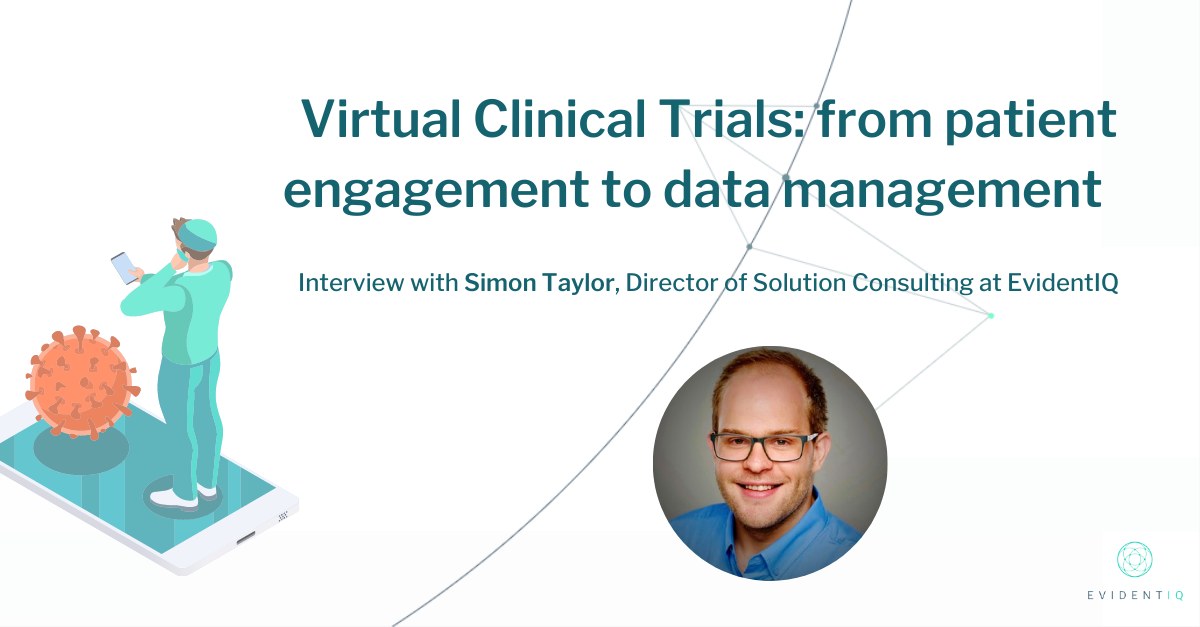I’m Gilda Teissier, Marketing Director at EvidentIQ and I recently met with Simon Taylor, Director of Solution Consulting at EvidentIQ
Modern Clinical trials have undergone a huge shift in the need for fit-for-purpose technology. It is more important than ever to have patient engagement activities unified with data management.
The following interview will give us an overview on the current clinical trial landscape and the importance of virtual clinical trials, as well as an insight on the EvidentIQ Way.
Gilda: Which are the drug development activities that will be impacted the most by COVID-19 and why?
Simon: It sounds obvious, but COVID has affected the in-person aspects of a trial, which it turns out, is a lot of it. The good thing that it has shown, is that there’s been a lot of redundancy in Clinical Trials that could/should be done online.
Gilda: What is a virtual clinical trial?
Simon: A truly virtual trial is one in which all aspects are done remotely and online. These mostly involve interventions that are either sent to the patients home, or those that do not require medical intervention at all.
"A truly virtual trial is one in which all aspects are done remotely and online."
Gilda: What are the benefits and challenges of virtual trials?
Simon: The benefits come from faster data collection, reduced costs from paper shipping and travel costs. There are a whole host of other benefits for a trial when time isn’t wasted going to and from a site, waiting for a shipment of paper to arrive as well as the benefits in data quality collected from using fit-for-purpose technology. It is perfectly feasible to see a more than 25% reduced study cost and more than 25% time and efficiency saving when using the right technologies
The challenges come from many aspects that often can’t be done online (like a blood draw or taking an x-ray), or from patients and contributors that are non technical users and who do not consider themselves tech savvy. For these particular users, this is where study and system expertise comes in; in designing tools and interfaces to make sure these users are trained adequately and the systems are designed to be as user friendly as possible.
Gilda: Which are the Issues with Current Clinical Trial Technology?
Simon: I personally feel that current trial technology is either not really built for the end users, or not able to span enough parts of the clinical trial to really make it really benefit the trial, instead you end up with a load of silo’ed systems that aren’t talking to each other and don’t give the real benefits that they could do.
Gilda: How can a clinical trial be more efficient?
Simon: First of all is fit-for-purpose technology that’s been intelligently thought through to ensure as much of the trial is done with the appropriate technology from the start. It takes planning and thought, but working out which aspects of the trial could be done using a system rather than paper. Once you’ve mapped out those inefficiencies, you can see some real efficiency gains and cost savings very quickly. It’s also worth thinking about how engaging your patients with technology can benefit as well, an often overlooked area of trials.
"...see some real efficiency gains and cost savings very quickly."
Gilda: What is the EvidentIQ Way?
Simon: The EvidentIQ way is to take a platform approach to making as much of a clinical trial online as possible, which also includes patient engagement, an area which traditionally has been silo’ed from the rest of Clinical Data Management. With this, we combine our Real World Evidence and Clinical platform to really bring trials into the 21st century.
"We combine our Real World Evidence and Clinical platform to really bring trials into the 21st century."
Gilda: Thank you for your time
For more information on and a deeper understanding on this topic be sure to check out the replay of the latest webinar conducted by XTalks and EvidentIQ. Click here to access it.




